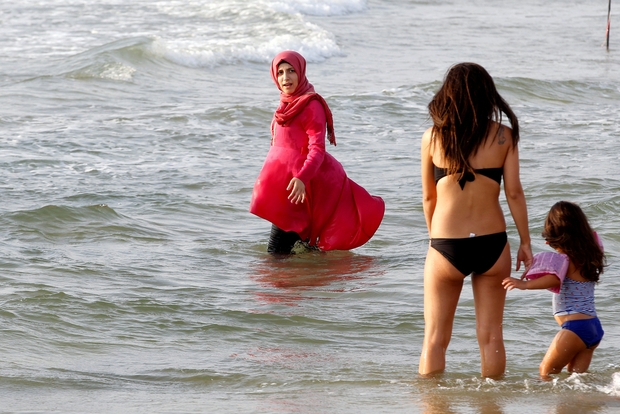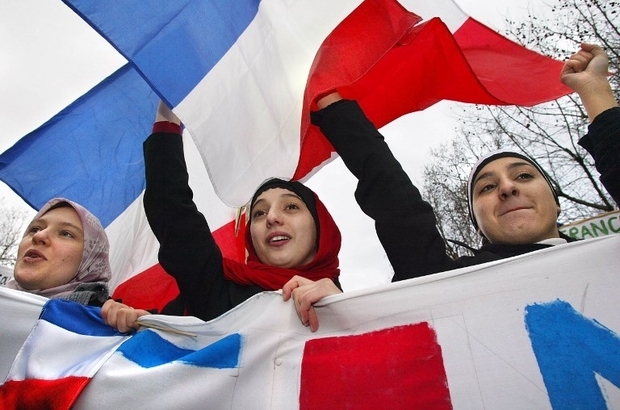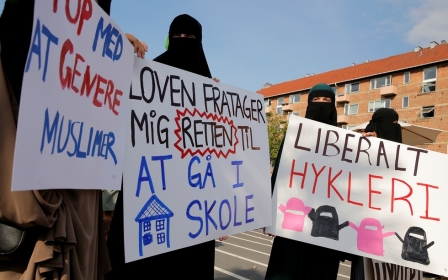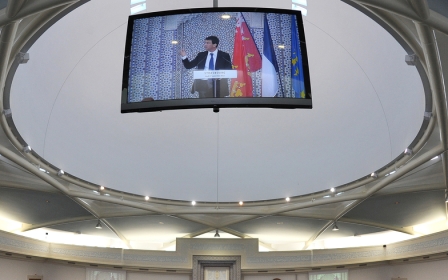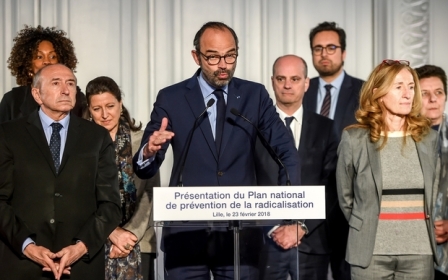When only 1 percent of veiled French women get a reply to their photo CV, that's a problem
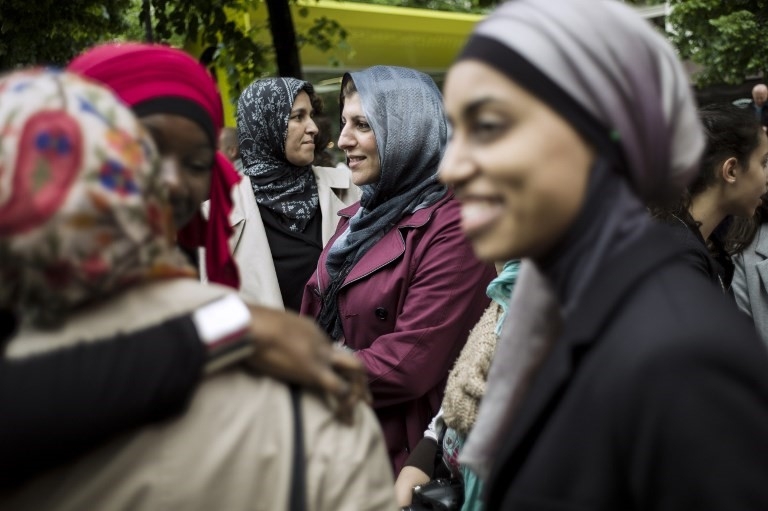
A coalition of 100 European women, myself included, co-authored an op-ed piece denouncing the discrimination faced by Muslim women in Europe in the jobs market.
The response to the article in outlets such as Boulevard Voltaire, Marianne, and Printemps Républicain all followed a similar line of simplistic reasoning, misleading readers and sweeping aside the valid concerns and carefully documented assessments of the co-signers of the petition.
Leading the way, one journalist from the French magazine Marianne claimed the piece was an organised attack on French secularism. The article went on to reiterate the arguments so often put forward by a certain fringe of the French political intelligentsia when it comes to Islamophobia and the inclusion of Muslims in France.
A one-sided view
The tone was established from the outset. "Under the cloak of fighting discrimination and of campaigning for 'gender equality', a declaration […] is suggesting the principle of religious neutrality is being used to discriminate against Muslim women", she wrote, not only implying that Muslim women couldn’t possibly be campaigning for gender equality but that the column in fact was a covert attack on religious neutrality.
The one-sided view of Muslim women as individuals who are either submissive or oppressed, or activists pursuing a hidden political agenda, is at best an uninformed view of the diversity of the group and at worst sexist and simplistic
This one-sided view of Muslim women as individuals who are either submissive or oppressed, or activists pursuing a hidden political agenda, is at best an uninformed view of the diversity of the group and at worst sexist and simplistic.
The Marianne journalist sees the women who signed the petition not as European citizens exercising the right to free expression but rather as members of a community acting covertly to advance a dubious agenda. This barely masked conspiracy theory includes the idea that Muslim women lack the capacity to engage, as individuals, with the social structure, and have no right to campaign for gender equality.
A case of lop-sided neutrality
The journalist then sets out to convince readers that the editorial is both a new step forward and "a direct attack on the 1905 French law guaranteeing state neutrality with regards to religion".
This is odd, to say the least, since we repeatedly stated that the principle of neutrality is essential, whereas the author made no reference to double standard we see in France today.
Those so-called champions of religious neutrality fail to be incensed when Emmanuel Macron sets out to restructure Islam in France, or when mayors deem it necessary to ban burkinis on public beaches
That the question of Islam and the integration of Muslims should even require a ruling at the state level constitutes a lack of neutrality in and of itself. And those so-called champions of religious neutrality fail to be incensed when Emmanuel Macron sets out to restructure Islam in France, or when mayors deem it necessary to ban burkinis on public beaches. Of course, we support religious neutrality, a cornerstone of the 1905 law that actually protects religious minorities.
There is clear hypocrisy in the advocating of religious neutrality when it comes to certain religious symbols people happen to find offensive (by this we mean the face veil), but the principle is not being applied across the board. It is symptomatic of the widespread Islamophobia in France that has been corroborated by the findings of numerous reports and academic studies.
How can the writer of the article in Marianne advocate religious neutrality while specifying that "an overly conspicuous Christian cross" is offensive - implying that a smaller-sized cross isn’t? Can we really talk about neutrality when allowances are made for certain religious symbols considered to be more culturally acceptable than others?
Why shouldn't 100 women, all of whom happen to be European citizens, speak out against a law or a court decision, such as the one passed by the European Court of Justice (ECJ) in March 2017 ruling that private employers may choose to ban religious symbols in the workplace, authorising them, what is more, to relegate Muslim women wearing headscarves to positions with no direct customer contact.
Obvious double standards
Prior to this decision, it was illegal in France for private companies to refuse to hire women who wear head-coverings, as doing so was considered discriminatory. Therefore, the situation today is all the more alarming given the findings of a 2014 report: only one percent of women who wear headscarves are interviewed by potential employers when they submit a CV with a photo.
There is no doubt about the discriminatory nature of this legislation, yet the ECJ ruling provides additional measures allowing employers to discriminate against French women who wear headscarves. As such, and rightly so, it is only natural that Muslim women should condemn a ruling which fails to advocate neutrality and almost exclusively targets women who wear veils.
Religious neutrality wasn’t even an issue until Muslim women wearing head-coverings became a more visible part of the workforce, so why the sudden need for "neutrality" when it comes to questions of religious identity?
Some women may be willing to remove their veils at work but it is the request itself that is really the issue. Asking a Muslim woman to remove her veil to work, or refusing to hire a woman on the grounds that an "overly conspicuous" religious affiliation may be bad for business, not only undermines the basic freedoms of conscience and worship but also opens the door to direct discrimination.
Though the ECJ ruling we criticise in our editorial doesn’t seem to have many people worried, if the same ruling were applied in another context the response would be quite different.
Take, for example, an employer refusing to hire homosexuals on the grounds that doing so would damage work relations with its conservative Gulf state clients, or worse still, asking employees to hide their homosexuality. It would be a no-brainer - a clear case of discrimination. The double standard here is obvious.
France has always looked to its neighbours for effective societal models. Yet foreign ideas and policies, in this case Anglo-Saxon, are rejected point blank when it comes to minorities. It is the French model or nothing that must prevail - if such a French model indeed exists at all.
Such a stance is wrong twice over in that this particular brand of French secularism has nothing to do with the one taught by historians specialising in the sociology of secularism, including Jean Baubérot and Jean Boussinesq. In France, the question is wide open. There is a multiplicity of views on secularism, a reality that some people are unwilling to acknowledge.
Moreover, a number of columnists condemning attempts to impose a so-called "Anglo-Saxon model" are in favour of the French model not because they consider it better or more effective but simply because it is French. Not only does this preclude critical thought as to the model's success or shortcomings, but such a rationale is ironically rooted in identity politics, the very crime we are accused of perpetrating.
Assimilation French-style
We did not write and sign our op-ed piece to promote the Anglo-Saxon model in France, or to advocate a multicultural model over the French assimilationist model. On the contrary, we are critical of public policy in France in that it refuses to assimilate Muslim women who decide to wear the veil.
By assimilation we mean a more far-reaching form of integration that would no longer differentiate between French people and French people of immigrant descent. Most sociologists evaluate levels of integration first through language proficiency and then through social integration, of which access to the labour market is key.
In France, however, a veiled woman is stuck with remaining just that - a veiled woman - along with all of the stereotypes that go along with it. It is impossible to talk about assimilation when veiled women entering the workforce are equated not to a particular skill set but rather to a particular community, a supposedly monolithic religion devoid of nuance and complexity.
Ironically for a country that claims to be assimilationist, veiled women are constantly relegated to their cultural identity.
A biased policy
This brings us to the underlying problem: the response of French leaders to concerns over the treatment of Muslim women in France.
There is a very real, but unaddressed, problem in France regarding the state and its Muslim citizens. Yet the French go on burying their heads in the sand without giving a second thought to the underlying causes. In September 2016, when the New York Times published stories about Muslim women confronted with discrimination, the then prime minister, Manuel Valls, accused the newspaper of biased reporting.
When the controversy over the burkini broke out and English media outlets everywhere were asking what went wrong in France, it was called French bashing. When the European Parliament opened a session addressing restrictions on Muslim women's clothing, the very legitimacy of the institution was dismissed, with claims it had yielded to the lobbying efforts of billionaire George Soros, an accusation enthusiastically embraced by anti-Semitic circles in Eastern Europe.
Let's take a closer look at the above-mentioned statistics: a study in France in 2014 showed that a CV with a name that sounds French received a 72 percent answer rate while the same CV with a photograph of a veiled Muslim woman received an answer rate of one percent.
Such widespread overt discrimination cannot be the result of a handful of racist or Islamophobic employers. It reflects a deeper, more systemic and inexorable problem on the institutional level.
Don’t get me wrong. That there is an institutional problem in France with women wearing a veil does not mean the French are racist. It means there is a public policy problem.
But if France’s institutional problem with women wearing religious head-coverings is not addressed, we will go on stigmatising those who sound the alarm, without ever amending established discriminatory policies.
- Hajar El Jahidi is advocacy coordinator for the European Forum of Muslim Women. You can follow her on Twitter: @HJahidi
The opinions expressed in this article are author’s own and do not necessarily reflect the editorial policy of Middle East Eye.
This article has been translated from the French version.
Photo: Women in Paris protest against the banning of the veil in schools (AFP)
Middle East Eye propose une couverture et une analyse indépendantes et incomparables du Moyen-Orient, de l’Afrique du Nord et d’autres régions du monde. Pour en savoir plus sur la reprise de ce contenu et les frais qui s’appliquent, veuillez remplir ce formulaire [en anglais]. Pour en savoir plus sur MEE, cliquez ici [en anglais].



